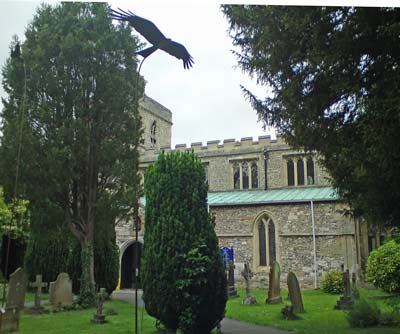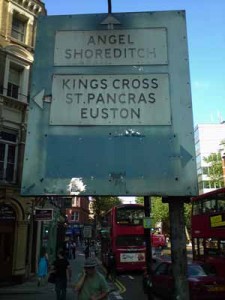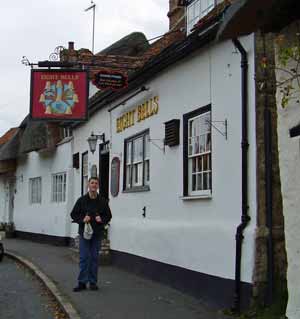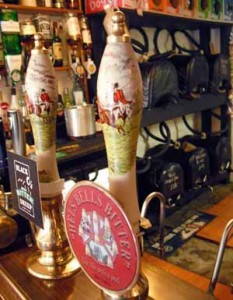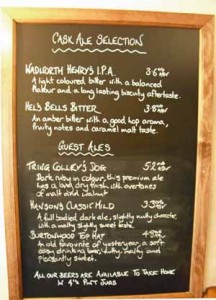One of London’s leading literary agents, Judith Murray from Greene and Heaton paid our group a visit on Wednesday night. She has a number notable authors on her list, perhaps the best known being Sarah Waters.
Judith mentioned at one point that the part of the role of an agent was to be an author’s advisor and advocate — and she spoke with such enthusiasm and showed such huge knowledge of the publishing business that it wasn’t hard to imagine the excellent job she would perform looking after her clients. I’d be tempted to say the authors on her list are a lucky bunch but that would belie the huge amount of effort that we learned is involved from both writer and agent before Judith represents a writer.
That said, sometimes there has been an element of serendipity in the way that Judith has come across authors — Sarah Waters had been sending off her manuscripts to publishers’ slush piles without success until she mentioned in passing to her neighbour that she was looking for a publisher — the neighbour happened to be a colleague of Judith’s at the time who suggested that Sarah sent the book to Judith — and it all went from there. Apparently the first few chapters of ‘Tipping the Velvet’ were published virtually unchanged from how they’d appeared in the first manuscript — requiring next to no editing. That the novel went on to great success makes a couple of related points: firstly, the opening pages of ‘Tipping the Velvet’ Â must have languished unnoticed on various publishers’ slush piles; secondly, the later success of both novel and author show the value of an agent who is passionate about the work.
This need for the professionals in publishing to be passionate about a novel was also emphasised by our visitor last week, Francesca Main. Judith receives about  20-25 unsolicited submissions a day — and she reads them all — but is likely take on a smaller number of authors than that in a whole year — less than half a percent.
Clearly, to have a chance of making it into that small number of acceptances, the novel will need to immediately engage her interest. Moreover, she reads the submissions from a necessarily commercial angle — if she can’t immediately think of three or four editors (out of the large number she knows) who would also be interested in that type of novel then it would be uneconomic to progress any further. The book might be a great piece of work but if there’s no market for it then it’s a tough fact of life.
Judith was candid enough to admit that she has passes over books that have later gone on to be published with success — she turned down at least one novel that went on to win a literary prize. However, that book that wasn’t to her personal taste and an agent really has to love a writer’s work for the relationship to be a success.
As we find with our own readings in the class, everyone has different literary preferences, and being rejected by an agent is not necessarily a reflection on the quality of the work. Writers need to develop a thick skin to cope with rejection — a quality that might count as much as many facets of literary ability but, given how novel writing is often so bound up with one’s own personality, then such persistence and self-belief are probably some of the most difficult personal qualities that writers need to develop.
Judith’s tastes, incidentally, tend towards good literary writing — but of the sort that has a strong narrative and engaging characters. She’s not a fan of intentionally self-conscious, experimental writing, which she enjoys intellectually but she says there are other agents who specialise in such genres.
As Francesca mentioned the previous weeks, Judith also re-inforced the tough conditions in the publishing market at the moment — since September 2008 publishers have become much more risk adverse and have erred on the side of safe bets — principally established authors with a good sales track record or the amazingly talented and disciplined celebrity novelists who somehow manage to dash off a novel while appearing in their soap operas or reality TV series. That said, Greene and Heaton had a particularly good year in 2009.
Nevertheless, the market is very tough and publishers won’t invest in a new author unless they’re confident that booksellers will promote it — the 3 for 2 table at Waterstone’s or its equivalent in Amazon. And the publishers are expected to contribute to those promotion so there goes any hope of an advertising budget.
The need to drum up interest in a new author in these straitened times also explains the long lead time often experienced by a novel from a new writer. Any promising work that lands on Judith’s desk now might not be published until early 2012. This is because the publishers will try to create a ‘buzz’ about the author — try to get good word of mouth recommendation, or endorsement by influential bloggers, solicit favourable reviews and so on. There’s a lot of work goes on to attract interest and raise the novel’s profile — and often the author’s personality can make a big contribution to this effort (again, it’s becoming less of a world for shrinking violets). Literary prizes are particularly important in boosting reputations.
Bearing in mind the long lead time, I asked a question about whether contemporaneously-set novels might be seen to date very quickly. Mine is set around now, or maybe in the last year, but would an agent think that in 2012 or 2013 that readers would think ‘Oh that’s so 2009’? On the other hand historical novels wouldn’t have that issue. The answer was not to worry — the main criterion is the quality of the writing by far.
All the work an agent does for an author was comprehensively outlined — including many aspects that most of us have hardly given a thought to, such as foreign rights. Essentially the agent is the author’s first professional reader and, as such, a good agent can use experience and contacts to guide an author right the way through the publishing process. An agent will offer sound advice throughout a writer’s career – and, given the investment in development of a new author, agents are interested in writers who offer the prospect of a long career (I hope that doesn’t mean that if you’re over 30 you’ve got no chance — let alone over 40).
One thing that authors in our position can’t expect, though, is a large amount of editorial intervention. While Judith really enjoys the process of working with an author to identify what might need to be improved in a novel, time-management pressures mean that she can’t help to substantially rewrite a novel. The writing has to be good in the first place. If it’s not then an agent won’t have the resources to turn prose that’s just OK into something better.
One piece of very useful advice, therefore, is don’t send work out to agents before it’s ready. The novel should be ‘good to go’ before it goes before an agent’s eyes. An agent generally won’t be able to give detailed feedback on novels that are rejected so it would be futile to send a first draft out and expect it to be returned with lots of detailed annotations on how it might be made better. Instead you’ll get a rejection but you’re not likely to know whether it was because the book as a concept was not commercial or because it was just sloppily written. At least if an author sends the best, most complete version of a novel then the chances of it being rejected on pure quality grounds are much reduced.
Similarly, there’s not much point sending in the first three chapters and a synopsis if the novel’s not complete. The agent might love it but won’t sign you up until he or she has read the whole novel — an agent needs to know if the writing can be sustained and developed over the course of a longer work. We might get some useful encouragement but no deal until the book’s completed. That said, Judith is very enthusiastic about spotting new talent and supports events such as our course reading evening and she encouraged us all to contact her with our work.
So how to contact an agent? The covering letter is important and is the first thing that is read. The quality of the letter will say a lot about the quality of the submitted novel. It should be concise — but should give an idea of what the novel is — just something like ‘thriller’ will often be sufficient. Information about the author is important — and we shouldn’t underestimate the value of writing courses such as ours — saying you’ve written the novel during the City University Novel Writing Certificate course will definitely make an agent take the submission a lot more seriously. Judith will then read the first part of the novel and only if she’s interested will she then read the synopsis — any decision will be made primarily on the writing itself.
So many writers don’t do research on which agents to contact — and the result is that much effort is wasted when agents receive work in unsuitable genres and the like. So how do you find an agent who will love your work? Apart from the Writers and Artists Yearbook, one clever trick is to find a book by an author whose work is similar to your own and then look in the acknowledgement pages — so long as the relationship hasn’t exploded there should be some thanks given by the author to an agent.
Or you could sign up to the City University course and have a few of them come along to listen to you giving a personal reading of your work — more scary than putting an envelope in the post but, fingers crossed, more effective: Judith represents Kirstan Hawkins, a course alumnus, who spoke to us last term after the reading event a couple of years ago.

